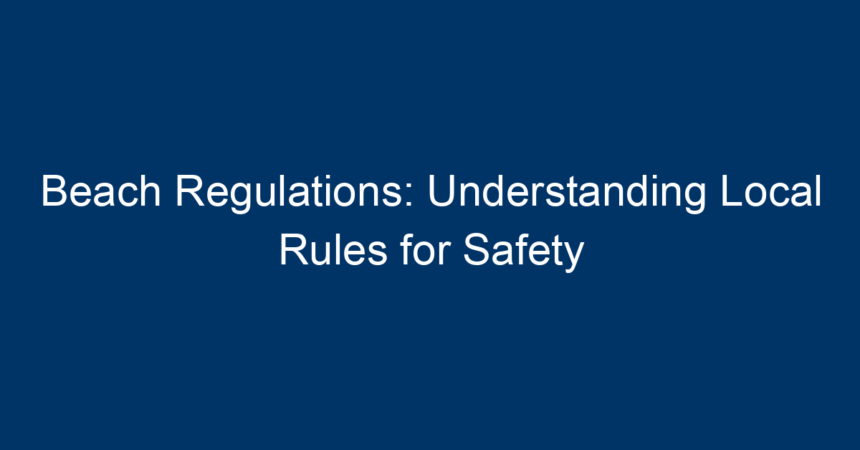As summer approaches, millions flock to sandy shores, yearning for sun-soaked days and the soothing sound of waves. While beaches offer a haven of relaxation and recreation, understanding beach regulations is crucial to ensuring a safe and enjoyable experience for everyone. Local rules help protect both visitors and the environment, ensuring that beach activities are enjoyable and sustainable. In this article, we’ll explore essential beach regulations, provide insights into safety measures, and offer tips for responsible beachgoing.
Why Beach Regulations Matter
Beach regulations are guidelines set by local authorities to maintain safety, protect wildlife, and preserve the natural beauty of coastal areas. These rules often vary from one beach to another, reflecting local ecosystems, community standards, and cultural values. Understanding these regulations not only keeps you safe but also helps you appreciate the delicate interplay of nature that makes each beach unique.
1. Swimming Safety Regulations
Know the Flags
Many beaches employ a flag system to inform swimmers about water conditions. It’s crucial to familiarize yourself with these signals:
- Green Flag: Safe swimming conditions.
- Yellow Flag: Moderate surf conditions; caution advised.
- Red Flag: High surf or dangerous currents; swimming is prohibited.
- Double Red Flags: The water is closed to the public; do not enter.
Pay attention to these flags to avoid accidents and ensure a safe swimming experience.
Lifeguard Presence
Some beaches have lifeguards on duty, while others do not. Always look for signs indicating lifeguard supervision. Even in areas where lifeguards are present, it’s essential to swim in designated areas to ensure assistance is readily available.
2. Safety Measures for Beach Activities
Alcohol Consumption Rules
Many beaches impose restrictions on alcohol consumption. Some allow it in designated areas, while others strictly prohibit it altogether. Always check local laws, as violating these rules can lead to fines or evictions from the beach.
Fires and Grilling
Cooking fires can enhance your beach experience, but regulations often dictate where and how you can use grills and bonfires. Look for designated fire pits and adhere to safety protocols to reduce fire hazards and protect the environment.
3. Environmental Protection Regulations
Wildlife Interactions
Beaches are vital habitats for various wildlife species, including nesting turtles and shorebirds. Guidelines often prohibit disturbing wildlife or their habitats. It is crucial to respect posted signs regarding turtle nesting sites and avoid feeding any wild animals.
Littering and Waste Disposal
Littering is not only disrespectful; it is illegal on most beaches. Many beaches have specific rules regarding waste disposal. Make use of designated trash and recycling bins. If bins are not available, consider bringing a bag to collect your waste and take it home.
4. Beach Access and Zone Regulations
Public and Private Beaches
Understanding the difference between public and private beaches is essential. While public beach access is typically free, private beaches can restrict entry to certain individuals. Respect property lines and always look for signage.
Dog Regulations
While many beaches welcome furry friends, others impose strict pet regulations. Common rules may include leash laws, designated dog hours, or total prohibitions. Always clean up after your dog, as neglecting this responsibility can mar the beach experience for others.
5. Watercraft and Jet Ski Regulations
Personal Watercraft Safety
If you plan to launch a kayak, jet ski, or other watercraft, familiarize yourself with local regulations regarding permits, speed limits, and designated launch areas. Many beaches have specific zones where watercraft are permitted to ensure the safety of swimmers.
Boating Restrictions
Boating regulations typically aim to protect swimmers and the local ecosystem. Pay attention to signage regarding no-wake zones and speed limits to ensure everyone’s safety.
6. Parking and Vehicle Regulations
Beach Parking Permit
Many beach areas require permits for parking. Ensure you have the correct permit displayed in your vehicle to avoid fines. Some spots may even restrict parking during peak hours, so plan accordingly.
Overnight Parking Rules
If you’re considering spending the night at the beach, check local regulations regarding overnight parking. Some beaches have strict policies against it to maintain safety and reduce disturbances.
Tips for Responsible Beachgoing
- Educate Yourself: Before heading to the beach, take the time to read up on local regulations.
- Respect the Environment: Leave no trace by disposing of waste properly and not disturbing wildlife.
- Stay Informed: Weather and surf conditions can change rapidly. Keep an eye on local news or apps for updates.
- Be Prepared: Bring all necessary supplies, including sunscreen, water, and a first aid kit.
- Check Amenities: Know what facilities are available at your beach, from restrooms to lifeguards.
Conclusion: Embrace Beach Regulations for a Safe Experience
Beach regulations are more than just rules; they are essential guidelines designed to protect everyone who enjoys the ocean’s bounty. By familiarizing yourself with beach regulations, you can contribute to a safer, cleaner, and more enjoyable environment for all.
Whether you’re swimming, sunbathing, or simply taking a leisurely stroll along the shore, honoring local rules is key to a rewarding beach experience. So next time you hit the sand, take a moment to reflect on the importance of these regulations. Your adherence to them will not only enhance your outing but also positively impact the beautiful landscapes and wildlife we cherish.
Enjoy the beach while respecting its regulations, and help ensure this haven remains a safe refuge for generations to come!




